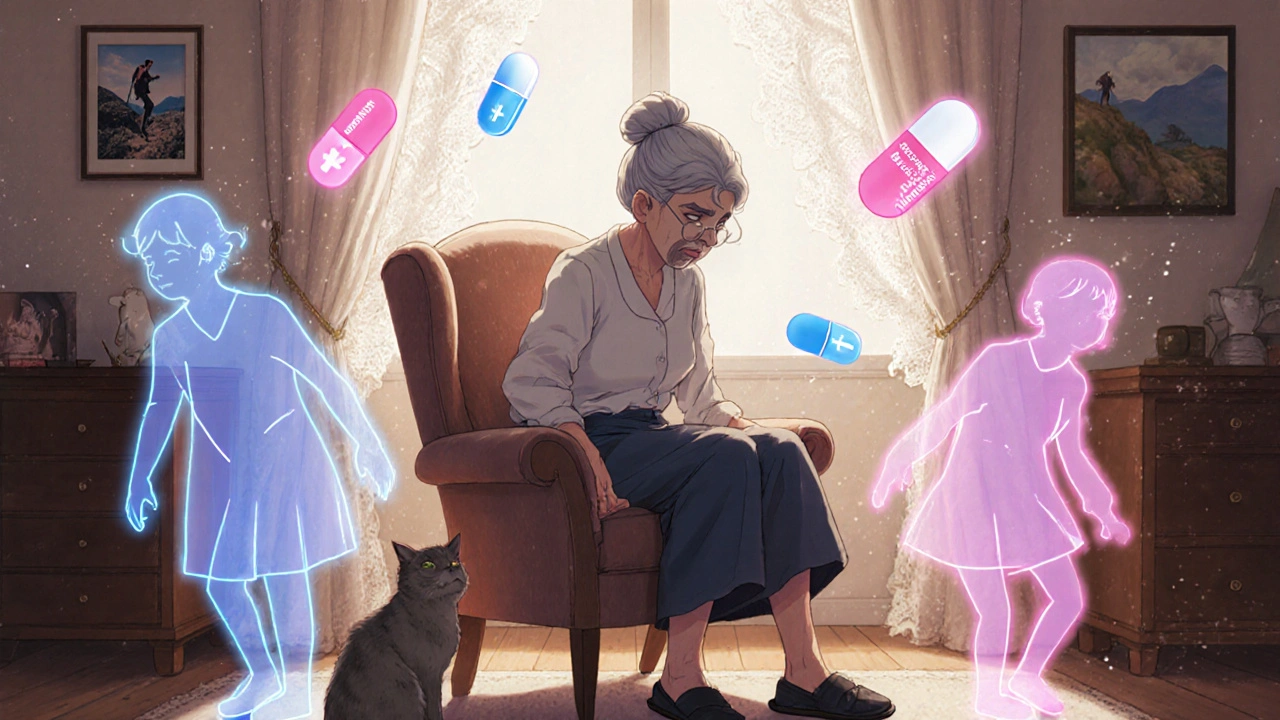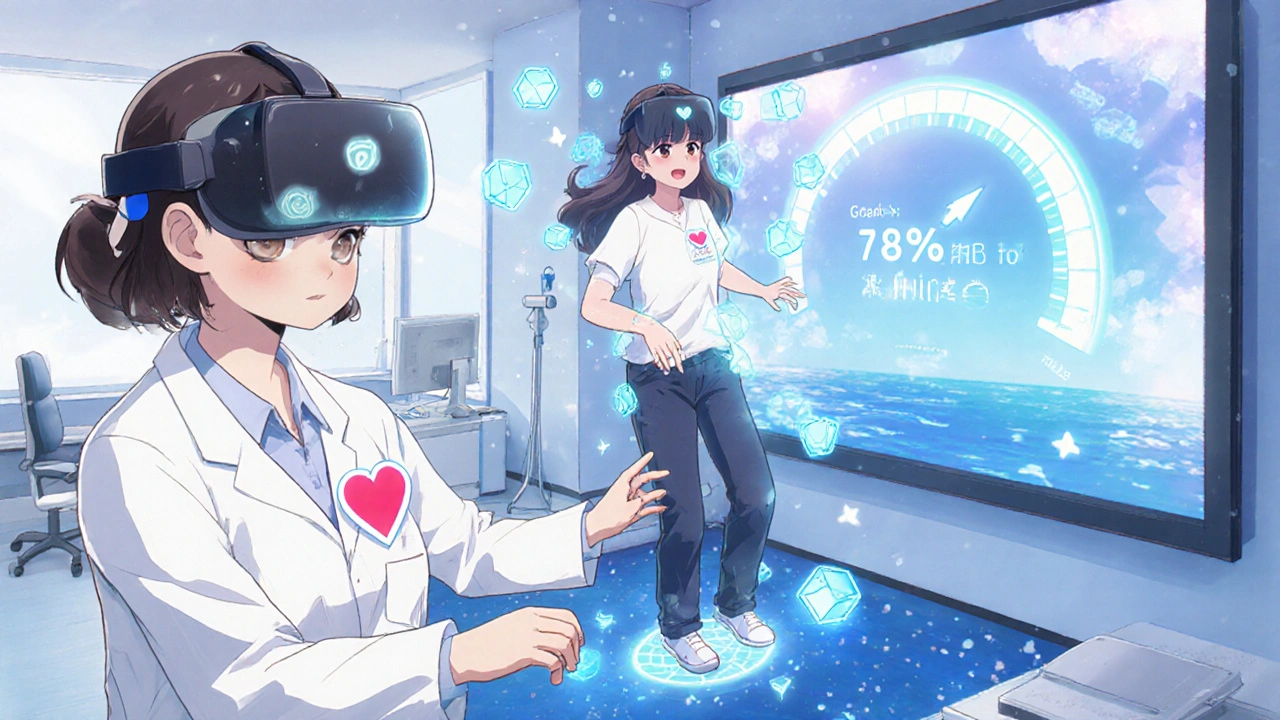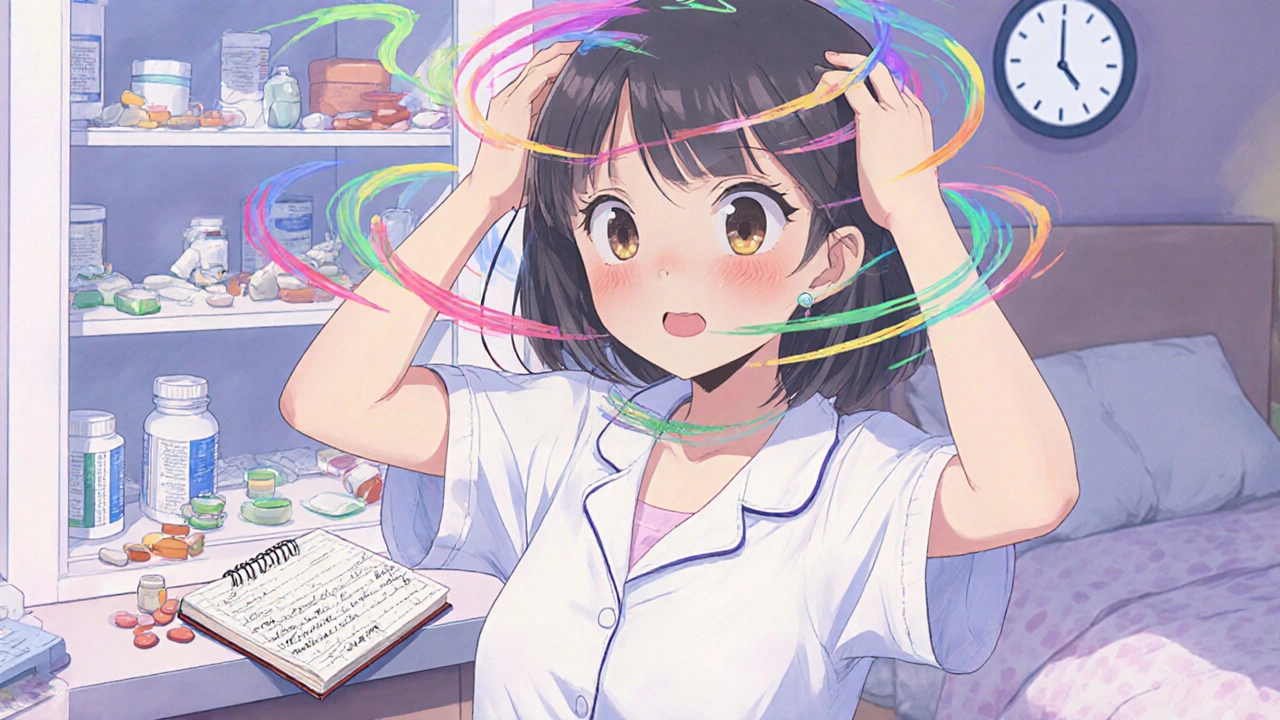Medication Dizziness Risk Calculator
Based on the article, this calculator estimates your dizziness risk based on the medications you select. Each medication class has a known dizziness incidence percentage from medical studies.
Key factors considered:
- Medication class dizziness rate
- Number of medications (polypharmacy increases risk)
- Age considerations (older adults are higher risk)
Disclaimer: This tool is for informational purposes only and should not replace medical advice. Always consult your doctor about medication side effects.
Feeling dizzy or lightheaded after taking a new medication isn’t just annoying-it can be dangerous. About 1 in 5 adults experiences dizziness each year, and nearly a quarter of those cases are directly linked to medications. For older adults, this isn’t just a nuisance-it’s a fall risk. One in three people over 65 falls at least once a year, and medications are often the hidden cause.
How Medications Make You Feel Dizzy
Dizziness isn’t one thing. It can feel like the room is spinning (vertigo), like you’re about to pass out (lightheadedness), or like you’re walking on a boat (unsteadiness). Medications cause these sensations by messing with three key systems in your body: your inner ear, your blood pressure, and your brain chemistry.Your inner ear holds tiny hair cells that tell your brain which way is up. Some drugs, like the antibiotic gentamicin, can permanently damage these cells. Studies show 17% to 40% of people on long-term gentamicin lose balance function. Chemotherapy drugs like cisplatin are even worse-up to 65% of patients end up with permanent vestibular damage.
Other drugs lower your blood pressure too much, especially when you stand up. This is called orthostatic hypotension. Blood pressure meds like lisinopril, furosemide, and propranolol are common culprits. When your blood pressure drops suddenly, your brain doesn’t get enough blood, and you feel faint. The American Heart Association now defines this as a drop of 20 mmHg systolic or 10 mmHg diastolic within 3 minutes of standing.
Then there are drugs that change brain chemicals. SSRIs like fluoxetine and sertraline can cause dizziness in up to 25% of people during the first few weeks. Tricyclic antidepressants like amitriptyline are even more likely to cause it. Even common drugs like antihistamines (used for allergies or sleep) and muscle relaxants can make you feel off-balance by slowing down signals in your nervous system.
Which Medications Are Most Likely to Cause Dizziness?
Not all drugs are created equal when it comes to dizziness. Some are far more likely to cause problems than others.| Medication Class | Example Drug | Approximate Dizziness Rate |
|---|---|---|
| Antiepileptic drugs | Carbamazepine | 29.7% |
| Diuretics | Furosemide | 22.1% |
| Beta-blockers | Propranolol | 19.7% |
| Tricyclic antidepressants | Amitriptyline | 28.4% |
| SSRIs | Fluoxetine | 25.3% |
| ACE inhibitors | Lisinopril | 14.2% |
| Aminoglycoside antibiotics | Gentamicin | 17-40% |
| Proton pump inhibitors | Omeprazole | 5.2% |
Even if a drug has a lower percentage, if millions of people take it, the total number of cases adds up. For example, omeprazole causes dizziness in just over 5% of users-but because it’s one of the most prescribed drugs in the world, it still contributes to 3.2% of all medication-related dizziness visits to U.S. emergency rooms.
Why Older Adults Are at Higher Risk
As you age, your body changes. Your blood pressure regulation slows down. Your inner ear hair cells naturally decline. Your liver and kidneys don’t clear drugs as quickly. And many older adults take five or more medications at once-a situation called polypharmacy.That combination is deadly for balance. People over 65 on five or more medications are three times more likely to feel dizzy than those on just one. The American Geriatrics Society’s 2023 Beers Criteria lists 17 medications that should be avoided in older adults because they increase fall risk. These include:
- Benzodiazepines (like diazepam)-increase fall risk by 50%
- First-generation antihistamines (like diphenhydramine)-42% higher fall risk
- Muscle relaxants (like cyclobenzaprine)-37% higher fall risk
Even newer drugs like SGLT2 inhibitors (used for diabetes) are showing up in post-marketing data with 9.3% dizziness rates. The 2024 update to the Beers Criteria is expected to add more of these to the warning list.

What to Do If You Feel Dizzy After Starting a New Drug
The first thing you should never do: stop the medication on your own. Stopping blood pressure drugs or seizure meds suddenly can cause seizures, heart attacks, or dangerous spikes in blood pressure.Instead, keep a simple symptom diary. Write down:
- When you felt dizzy (right after taking the pill? 2 hours later?)
- How long it lasted
- What you were doing (standing up? walking? lying down?)
Studies show 68% of medication-related dizziness cases follow a clear pattern tied to when the drug is taken. This helps your doctor decide if it’s the drug or something else.
Your doctor may use the Naranjo Scale-a tool that rates how likely a drug caused the side effect. A score of 9 or higher means it’s a definite match.
How Doctors Manage Medication-Induced Dizziness
There’s no one-size-fits-all fix, but here’s what works:- Confirm the link. Sometimes, stopping the drug for 4-6 weeks (under supervision) is the only way to know for sure.
- Assess fall risk. Tools like the Hendrich II Fall Risk Model help doctors decide how urgent the problem is.
- Switch or adjust. If you’re on a high-risk drug, there may be a safer alternative. For example, switching from a tricyclic antidepressant to an SSRI might reduce dizziness. Or lowering the dose of a blood pressure pill can help without losing its benefit.
- Use non-drug fixes. Vestibular rehabilitation therapy (VRT) is a type of physical therapy that retrains your balance system. Studies show 70-80% of people with persistent dizziness improve after 6-8 sessions. Virtual reality-based VRT is even more effective, with one 2023 study showing 82% symptom reduction.
For orthostatic dizziness, simple habits help: sit on the edge of the bed for a minute before standing, wear compression stockings, and drink water before getting up. A 2022 study found these steps cut symptoms by 45%.

What’s Next? The Future of Managing Drug-Induced Dizziness
Science is moving fast. Researchers have already found 17 genetic variants that make some people more likely to get dizzy from blood pressure meds. In the future, a simple DNA test might tell your doctor which drug is safest for you.The NIH’s All of Us program is collecting balance data from 1 million people to build prediction models. Meanwhile, regulatory agencies are tightening rules. The FDA now requires black box warnings on aminoglycosides. The European Medicines Agency recommends routine hearing and balance tests for patients on cisplatin.
And the definition of the problem is changing. The International Headache Society now officially recognizes “medication-induced vestibular syndrome” as a distinct condition. That means doctors are finally treating it as a real medical issue-not just a side effect you have to live with.
Bottom Line: Don’t Ignore It, But Don’t Panic Either
Dizziness from medication is common-but it’s not normal. If you’re feeling off-balance after starting a new drug, it’s worth talking to your doctor. Keep track of your symptoms. Don’t stop your meds on your own. Ask about alternatives. And consider vestibular rehab if it lasts more than a few weeks.Most people improve once the right drug is found-or the dose is adjusted. But ignoring it? That’s when the real danger starts: falls, fractures, hospital stays, and loss of independence. Your balance matters. And your medication should help you live better-not make you feel like you’re walking on ice.
Can dizziness from medication go away on its own?
Yes, in many cases. If the dizziness is caused by starting a new medication, it often improves within a few days to weeks as your body adjusts. This is especially true with SSRIs and blood pressure drugs. But if it lasts longer than 4-6 weeks, doesn’t improve with dose changes, or gets worse, it’s likely not just an adjustment phase. Permanent damage-like from gentamicin or cisplatin-can occur, so don’t wait too long to get it checked.
Is dizziness always a sign of a serious problem?
Not always, but it shouldn’t be ignored. Mild, short-lived lightheadedness after standing up quickly is common and often harmless. But if you feel like the room is spinning, have trouble walking, feel nauseous, or lose your balance often, it’s likely more than just a side effect. It could signal inner ear damage, dangerously low blood pressure, or a drug interaction. When in doubt, get it evaluated.
Can I take over-the-counter meds for dizziness while on prescription drugs?
Be very careful. Many OTC dizziness meds-like meclizine or dimenhydrinate-are antihistamines, and they can make the problem worse by further suppressing your vestibular system. They may help short-term motion sickness, but they don’t fix the root cause. In fact, they can delay diagnosis and increase fall risk, especially in older adults. Always check with your doctor or pharmacist before adding anything.
What’s the difference between dizziness and vertigo?
Dizziness is a broad term-it includes feeling faint, unsteady, or lightheaded. Vertigo is a specific type of dizziness where you feel like you or your surroundings are spinning. Medications like gentamicin or high doses of aspirin can cause true vertigo by directly affecting your inner ear. Vertigo is more likely to be linked to vestibular damage, while lightheadedness is often tied to blood pressure changes.
Are there natural ways to reduce medication-induced dizziness?
Yes-but they’re supportive, not replacements. Staying hydrated, avoiding alcohol, moving slowly when standing, and doing balance exercises like tai chi can help. Vestibular rehabilitation is the most effective non-drug treatment. Some people find relief with ginger or magnesium, but there’s no strong evidence they fix drug-induced dizziness. The real fix is adjusting or changing the medication under medical supervision.
Can I still drive if I feel dizzy from my medication?
If your dizziness is sudden, frequent, or affects your balance, you should not drive. In many places, including New Zealand, you’re legally required to inform the transport authority if a medical condition affects your ability to drive safely. Even if you feel fine most of the time, a sudden episode while driving could be deadly. Talk to your doctor about whether it’s safe-and if not, ask about alternatives or timing your doses to avoid peak dizziness during driving hours.
How long does vestibular rehabilitation take to work?
Most people start noticing improvement after 3-4 sessions, but full results usually take 6-8 weekly sessions. The therapy involves specific head and body movements designed to retrain your brain to rely on other balance signals when your inner ear is damaged. Consistency matters-you’ll need to do the exercises at home too. Studies show 75-85% of patients maintain improvement for at least five years after completing the program.
When to Seek Immediate Help
Dizziness is rarely an emergency-but these signs mean you need care right away:- Sudden, severe vertigo with vomiting or inability to walk
- Dizziness with chest pain, shortness of breath, or irregular heartbeat
- Dizziness after a head injury
- Loss of vision, slurred speech, or weakness on one side of the body
These could signal a stroke, heart problem, or serious neurological issue-not just a drug side effect. Don’t wait. Call for help.

Nicole M
November 11, 2025 AT 00:05I started feeling dizzy after my doctor switched me to lisinopril last month. Thought I was just dehydrated, but after reading this, I realized it’s probably the med. I kept a diary like they suggested and noticed it hits 90 minutes after I take it. Made an appointment to talk about switching to an ARB instead.
Arpita Shukla
November 11, 2025 AT 09:52Actually, most of these side effects are predictable if you understand pharmacokinetics. Older adults have reduced CYP450 enzyme activity, slower renal clearance, and decreased plasma protein binding-all of which amplify drug concentrations. The Beers Criteria exists because this isn’t new science. It’s just that doctors keep prescribing like patients are 30-year-olds with perfect liver function.
Benjamin Stöffler
November 12, 2025 AT 09:09Let’s be honest: modern medicine has become a high-stakes game of Russian roulette with pharmaceuticals. We’re told to trust the system, but the system is built on clinical trials that exclude the elderly, the chronically ill, and anyone over 70 who actually needs these drugs. Gentamicin? It’s a chemical scalpel-and we’re using it like a butter knife. We don’t treat dizziness as a symptom-we treat it as an inconvenience. And that’s not just negligent-it’s existential.
When did we stop seeing patients as whole human beings and start seeing them as data points in a drug company’s revenue stream?
Mark Rutkowski
November 14, 2025 AT 01:43There’s something deeply human about losing your balance-not just physically, but emotionally too. We’re taught to push through, to ‘tough it out,’ but when your body starts betraying you, it’s not just about pills and percentages. It’s about dignity. The fact that vestibular rehab works for 80% of people? That’s not a statistic-that’s hope. And hope, in a world that’s too quick to prescribe and too slow to listen, is the rarest medicine of all.
Maybe the real cure isn’t in swapping one drug for another… but in learning to listen again-to our bodies, to our elders, to the quiet signals we’ve trained ourselves to ignore.
Ryan Everhart
November 14, 2025 AT 10:44So let me get this straight-you’re telling me I should stop taking my 5 meds cold turkey because I feel a little woozy? And instead, I should… write things down? Wow. Groundbreaking. Next you’ll tell me breathing helps.
Also, why is every single one of these drugs listed as a culprit? Is there a pill that doesn’t make you feel like you’re on a sinking ship? Or is the real problem that we’re all just one blood pressure med away from becoming a human摇晃的陀螺?
David Barry
November 16, 2025 AT 05:14Here’s the real issue: the data is skewed. Most studies on dizziness are conducted on middle-aged, healthy, compliant patients. The people who actually get dizzy and fall? They’re excluded because they’re ‘non-adherent’ or ‘too complex.’ Meanwhile, the FDA approves drugs based on trials where the average age is 52. The population that’s dying from these side effects? Average age: 78. We’re not fixing the problem-we’re just ignoring the people it’s killing.
Alyssa Lopez
November 16, 2025 AT 22:57OMG I just realized my grandpa’s falling is because of his omeprazole?? That’s insane. Like, how is this even legal? We need to ban these meds for seniors. Like, immediately. Like, no more excuses. This is a national crisis and nobody’s talking about it. #MedicationSafetyNow
Alex Ramos
November 18, 2025 AT 06:54Been doing VRT for 6 weeks now after my cisplatin treatment. 80% better. The exercises suck at first-like trying to balance on a wobbly stool while blindfolded-but your brain learns. Do the drills daily. Even 5 minutes. And get a physical therapist who knows vestibular stuff-not just any PT. It’s life-changing. 🙌
edgar popa
November 18, 2025 AT 16:06took me 3 weeks to realize my dizziness was from the zoloft. stopped it cold, felt like a zombie for 2 days, then boom-normal. never took it again. dont be afraid to ask your doc for a break.
Eve Miller
November 20, 2025 AT 08:28It’s not ‘dizziness’-it’s vestibular toxicity. And if you’re not documenting onset, duration, and positional triggers with precise timestamps and symptom severity scales, you’re not helping your doctor-you’re wasting their time. Use a standardized tool like the Dizziness Handicap Inventory. And stop saying ‘I feel weird.’ Be specific.